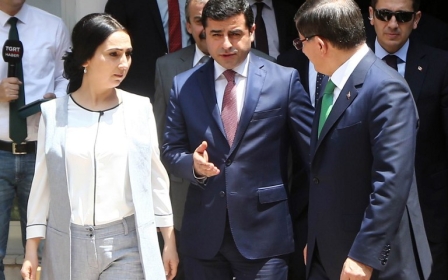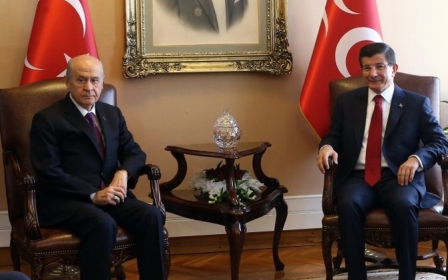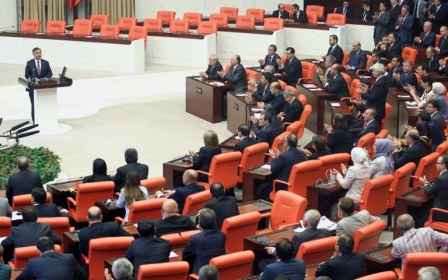AKP develops power-sharing plan ahead of second round of coalition talks

With Turkish Prime Minister Ahmet Davutoglu set to hold a second round of talks with party leaders this week, his Justice and Development Party (AKP) has agreed power-sharing protocols and priority policies to negotiate with its potential ally.
After AKP failed to win a majority vote during the 7 June elections, it has been pushed to forge a coalition government for the first time since 2002.
The protocol drafted by the AKP, which reviewed processes used by past coalition governments, appears to be a flexible one that may be fine-tuned once a partner comes on board, reported Hurriyet Daily News.
Davutoglu completed the first round of coalition talks with leaders of the Republican People’s Party (CHP), the Nationalist Movement Party (MHP) and the Peoples’ Democratic Party (HDP) last week.
Only CHP showed a clear interest in an alliance. MHP has refused to join hands with AKP which, in turns, has said an alliance with HDP is unlikely.
While full details of the protocol have not been disclosed, Turkish media reported that, in addition to mechanisms of power-sharing and top policy priorities, the AKP draft also calls for the establishment of a special team for resolving possible crises with their future partner.
Changes in personnel at ministries and affiliated institutions will take place through decrees and the approval of both coalition partners, according to initial reports on the protocol.
Appointments, replacements and dismissals which require the approval of the prime minister would, therefore, also require the endorsement of the partner party’s deputy prime minister.
Election threshold
The protocol also reportedly outlines a plan to lower the controversial 10 percent national election threshold to 5 or 7 percent, according to Hurriyet Daily News.
The move to lower the threshold comes in the face of rising domestic and international criticism of the Turkish electoral system. A final decision would be reached after consultations with AKP’s coalition partner, reported Hurriyet Daily News.
Turkey's electoral system currently requires a party to win at least 10 percent of the national vote to enter parliament – the highest threshold of any country in the world.
If the pro-Kurdish HDP had not managed to pass the threshold in the 7 June election, it would not have gained any seats or representation in the parliament and its forfeited seats would have been reallocated to larger parties.
AKP’s chief advisor Huseyin Celik said a good protocol could help facilitate an alliance between his party and the main opposition CHP, reported Hurriyet.
But whether a coalition is formed or whether Erdogan calls a snap election if a coalition is not agreed within 45 days of the election, the AKP still reportedly aims to push for the threshold reduction, Hurriyet reported.
Probable AKP-CHP alliance
While most analysts had expected an alliance between AKP and the nationalist MHP, Celik told reporters that a coalition government with the CHP would be more sustainable from his point of view.
“Political parties whose grassroots are similar to each other hardly agree,” Celik told daily Hürriyet, while likening AKP and MHP which have overlapping constituencies, to shopkeepers who are rivals.
Instead, Celik said that prospects are much more positive for an AKP-CHP alliance.
“We are at an advanced point with the CHP,” Celik said, elaborating on results of last week's first round of coalition talks.
Analysts and observers have also said an AKP-CHP alliance is quite a likely scenario.
“An AKP-CHP coalition government seems like the most probable scenario right now,” Turkish political analysts and commentator Ceren Kenar told MEE after last week’s round of talks.
There are however several issues that still need to be negotiated before an alliance can be agreed, she added.
“There are many differences [between CHP and AKP] in terms of key policies, [and specifically] foreign policy is one of these areas," Kenar said. “Moreover, these two parties [CHP and AKP] represent opposite traditions in Turkish politics."
AKP and CHP have traditionally been seen as fierce rivals with AKP appealing to many conservative and religiously inclined Turks, while CHP remains popular among staunchly Kemalist, secular Turks.
According to Celik, despite a plunge in votes for AKP during the recent elections, post-elections surveys show that AKP popularity is back on the rise to around 45 percent of the electorate, Celik told Hurriyet.
But while an imminent coalition government may be in sight for Turkey, analysts have said it appears that Erdogan is not in favour of this scenario.
Kenar told MEE last week that rumours going around Turkey suggest that Erdogan is not enthusiastic about a coalition government and prefers pushing for snap elections instead.
Similarly, Celik told Hurriyet on Monday that after a party meeting last week, none of AKP’s prominent figures believed that a coalition government was the president’s preference.
Stay informed with MEE's newsletters
Sign up to get the latest alerts, insights and analysis, starting with Turkey Unpacked
Middle East Eye delivers independent and unrivalled coverage and analysis of the Middle East, North Africa and beyond. To learn more about republishing this content and the associated fees, please fill out this form. More about MEE can be found here.




